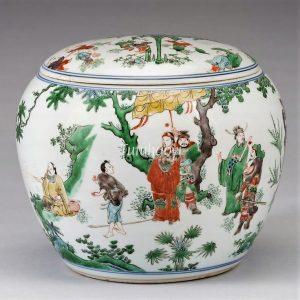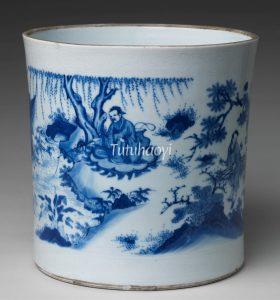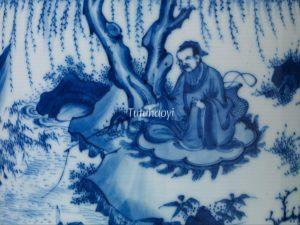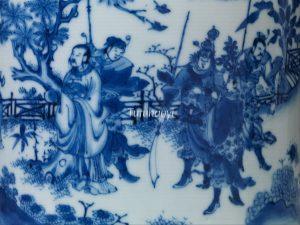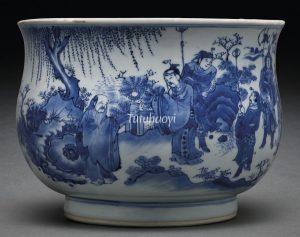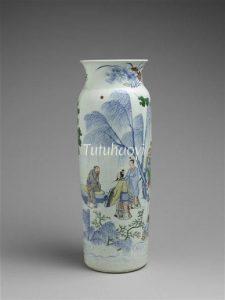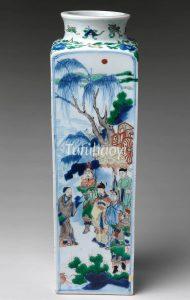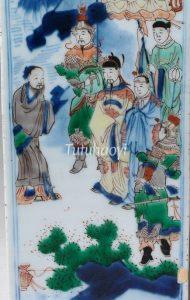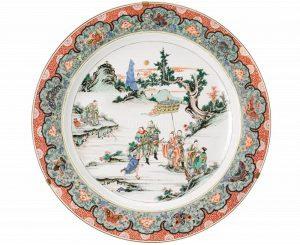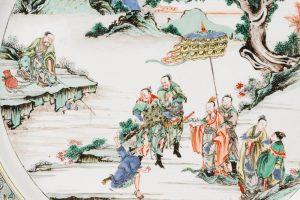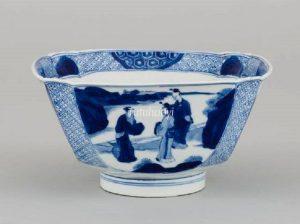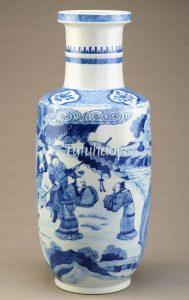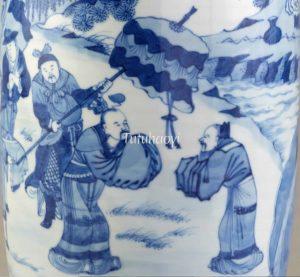Jiang Ziya Was Discovered Angling by Baron of Zhou by the Wei River
姜太公渭滨垂钓
© Tutuhaoyi.com owns the copyright of the description content for the images attached. Quoting all or part of the description content on this page is permitted ONLY IF ‘Tutuhaoyi.com’ is clearly acknowledged anywhere your quote is produced unless stated otherwise. (本页描述内容版权归Tutuhaoyi.com所有,转发或引用需注明 “Tutuhaoyi.com”, 侵权必究, 已注开源信息的条目除外。)
When the Baron of the Zhou vassal state (周西伯) did a divination with oracle bones for his imminent hunting trip, the message came: ‘You will not catch a small bear or a large bear, but a teacher will be presented to you by the divine power.’ After bathing and fasting for three days, the baron arrived at the River Wei, he saw an elderly man sitting on a grassy mat with a fishing rod beside him at the bank. The baron respectfully bowed to him and politely asked him to be his mentor. He invited the man to sit in his vehicle on the way back to the capital. This elderly man was Jiang Ziya (姜子牙), the famous sage strategist in ancient China. Later, when the baron passed away, his son, who posthumously bestowed his father the title of King Wen (文王), called himself King Wu (武王). With the able assistance of Jiang, who was then respectfully called Jiang Taigong (姜太公), King Wu launched a military campaign to overthrow the ruling Shang house (商, ca. 1600 BCE–1046 BCE) and established the new Zhou dynasty (1046 BCE–256 BCE), which lasted about eight hundred years.
There is another story about Jiang Ziya on his assistance to King Wu in launching a military campaign to overthrow the Shang house. Dr Yibin Ni also wrote an article on the identification of Jiang’s famous yet mysterious ride.
References:
- 倪亦斌:《子牙垂钓遇文王 明君得辅破殷商》,《读者欣赏》,兰州:读者出版传媒股份有限公司,2016-05,58–63 页
- Jeffrey P. Stamen and Cynthia Volk with Yibin Ni (2017), A Culture Revealed: Kangxi-Era Chinese Porcelain from the Jie Rui Tang Collection 文采卓然:潔蕊堂藏康熙盛世瓷, Jieruitang Publishing, Bruges, pp. 92-93.
Fig 1: lidded porcelain jar, Chongzhen period (1628–44), Ming dynasty, courtesy of the Sir Michael Butler Collection
Fig 2-5: brush pot, Chongzhen period (1628–44), Ming dynasty, courtesy of the Metropolitan Museum of Art, NY
Fig 6: porcelain censer, Chongzhen period (1628–44), Ming dynasty, courtesy of the Sir Michael Butler Collection
Fig 7: Rolwagen vase, Transitional Period, 17th century, courtesy of The Guimet Museum, Paris
Fig 8-9: porcelain vase, Shunzhi period (1644–61), Qing dynasty, courtesy of the Metropolitan Museum of Art, NY
Fig 10-11: famille verte dish, Kangxi period (1662–1722), Qing dynasty, courtesy of the Jie Rui Tang Collection
Fig 12: porcelain bowl, Kangxi period (1662–1722), Qing dynasty, courtesy of The Dresden Porcelain Collection, State Art Collections of Dresden, Germany
Fig 13-14: porcelain vase, mid 17th – early 18th century, courtesy of Freer Gallery of Art
